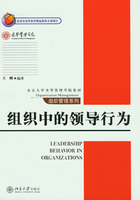
参考文献
[1] 〔美〕伯恩斯著,刘李胜等译:《领袖论》,中国社会科学出版社,1996年版。
[2] 〔美〕罗斯·特里尔,《毛泽东传》,中国人民大学出版社,2006年版。
[3]《现代汉语词典(修订本)》,商务印书馆,1998年版。
[4] 陈永霞、贾良定、李超平、宋继文、张君君,“变革型领导、心理授权与员工的组织承诺:中国情景下的实证研究”,《管理世界》,2006年第1期,第96—105页。
[5] 董临萍,“论危机处理中的魅力型领导”,《经济与管理研究》,2005年第12期。
[6] 李超平、时勘,“变革型领导与领导有效性之间关系的研究”,《心理科学》,2003年第26卷第1期。
[7] 李超平、田宝、时勘,“变革型领导与员工工作态度:心理授权的中介作用”,《心理学报》,2006年第38卷第2期,第297—303页。
[8] 刘玉瑛,《领导影响力》,人民出版社,2004年版。
[9] 孙建国、田宝,“变革型领导及其对创新文化的影响”,《管理评论》,2006年第5期。
[10] 王辉、牛雄鹰,“领导-部属交换的多维结构及对工作绩效和情境绩效的影响”,《心理学报》,2004年第2期。
[11] 王新,“魅力型领导者个性和行为特征”,《现代领导》,2004年第11期。
[12] 徐长江、时勘,“变革型领导与交易型领导的权变分析”,《心理科学进展》,2005年第13卷第5期,第672—676页。
[13] Bass, B.M., &Avolio, B.J., “Developing Transformational Leadership:1992 and beyond”, Journal ofEuropean Industrial Training,1990,14,21—27.
[14] Bass, B.M., Leadership and Performances beyond Expectations, New York:The Free Press,1985.
[15] Conger, J.A., &Kanungo, R., Charismatic Leadership in Organizations, Thousand Oaks, CA:Sage Publications,1998.
[16] Conger, J.A., The Charismatic Leader: Behind the Mystique ofExceptional Leadership, San Francisco:Jossey-Bass,1989.
[17] Conger, J.A., &Kanungo, R.N., “Toward a Behavioral Theory of Charismatic Leadership in Organizational Settings”, Academy ofManagement Review,1987,12,637—647.
[18] House, R.J., “A 1976 Theory of Charismatic Leadership”, in J.G.Hunt and L.L. Larson(Eds.), Leadership: The Cutting Edge(189—207), Carbondale: Southern Illinois University Press,1977.
[19] House, R.J., Spangler, W.D., &Woycke, J., “Personality and Charisma in the US Presidency: A Psychological Theory of Leader Effectiveness”, Administrative Science Quarterly, 1991,36,364—396.
[20] Wang H., Law, S.K, Hackett, R., Wang, D., &Chen, Z., “Leader-Member Exchange as a Mediator of the Relationship Between Transformational Leadership and Followers'Performance and Organizational Citizenship Behavior”, Academy of Management Journal,2005,48, 420—432.
[21] Weber, M., The Theory of Social and Economic Organizations, translated by T.Parsons, New York: Free Press,1947.